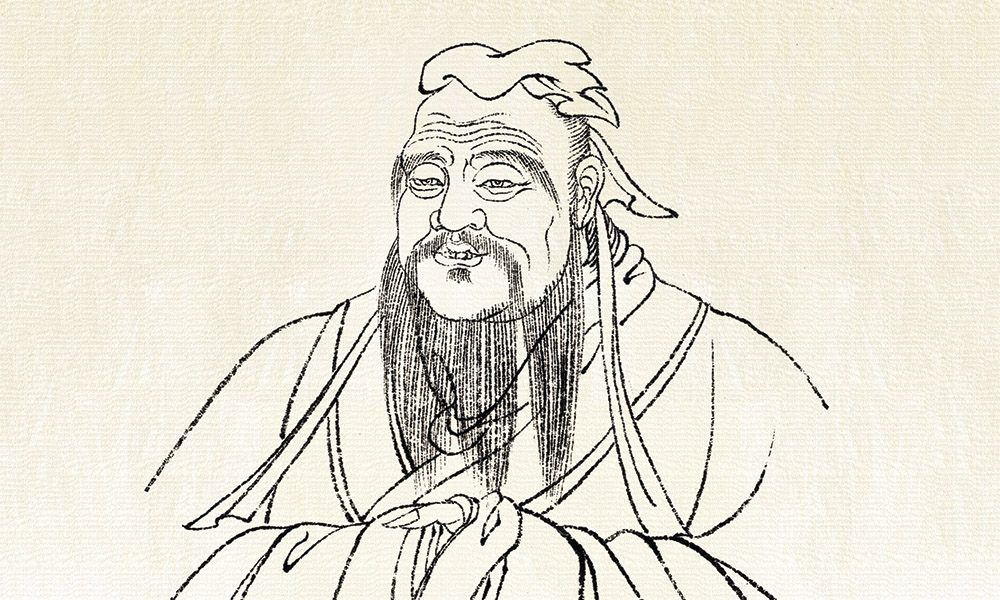By Zhou Huixin
The late Spring and Autumn Period of the Zhou Dynasty was marked by turbulence and a degradation of moral values.
Unlike the virtuous rule of their predecessors, the rulers of the various states were motivated by personal self-interest and selfish desires. Relationships broke down, and the states fought amongst each other.
It was during this tumultuous period that the Hundred Schools of Thought philosophical movement began. Three important sages — Confucius, Shakyamuni, and Laozi (老子) — appeared to spread their great systems of thought: Confucianism, Buddhism, and Taoism respectively.
To say that these three religions left a profound and lasting impact on Asian society is an understatement. They have defined Asian culture and civilisation for 2,500 years, and continue to do so today.
Amongst the three sages, Confucius arguably had the greatest influence on ancient China’s governance and social forms. He was also a wise and dedicated teacher who led by example, and has been honoured as the “head teacher for 10,000 years” and the “teacher of all teachers”.
To commemorate Confucius’ 2,567th birthday this September 28, we share some interesting stories about this great sage.
Confucius Learns the Guqin (古琴)
Over two and a half millennia ago, on 28 September 551 B.C., a boy of remarkable destiny was born. His name at birth was Kong Qiu (孔丘), styled Zhong Ni (仲尼) (a traditional Chinese “style name” given after age 20 to mark the coming of age).
Confucius lived in the State of Lu and was a descendent of royalty from the Shang Dynasty. However, he was born into poverty. His mother was the concubine of an elderly officer, and his father passed away when he was only three.
Nevertheless, Confucius loved to study, and he mastered poetry, history, and the six arts, which includes the study of music.
Confucius learned music and the art of playing the guqin under Shi Xiangzi (师襄子), the music official of the Lu State and a master guqin player.
When Confucius first began his lessons with Shi Xiangzi, he kept practicing with the same piece of music for ten days straight. A puzzled Shi Xiangzi encouraged Confucius, “You can now move on to practice other music pieces.” But Confucius replied, “Although I am familiar with the melody’s form, I have yet to master the piece’s technique.”
After Confucius had practiced for some time, Shi Xiangzi said, “You’ve already mastered the technique of this piece. Why don’t you proceed to learn the next piece?” Confucius replied, “I have yet to understand the artistic conception of the piece.”
After further practice, Shi Xiangzi nudged Confucius again. “Now that you’ve already understood the artistic conception of the piece, you can progress to other pieces.” However, Confucius replied, “I have yet to understand the composer of the piece.”
After even more practice, Confucius finally stopped one day and sat deep in thought. Suddenly, he beamed and proclaimed confidently, “I finally know who the composer is. He is dark-skinned, slim in build, far-sighted in his decisions, and has the demeanour of a noble ruler of many states. Who else could it possibly be but King Wen of Zhou!”
Upon hearing this, Shi Xiangzi left his seat and bowed twice to Confucius. He respectfully said, “You’re absolutely right! The name of this piece is ‘The March of King Wen’.”
This anecdote exemplifies how much dedication and careful thought Confucius placed into his studies, a trait that would accompany him for life.
‘Laozi Is Like a Dragon’
Having lived during the same time period, the two great sages Confucius and Laozi actually crossed paths many times. Confucius constantly sought out Laozi for guidance on the Tao, and learnt a lot from him. These visits have been documented in many historical records, such as the Classic of Rites, the Records of the Grand Historian, and the Zhuangzi (庄子).
After returning from one particular visit with Laozi, Confucius famously sighed to his disciples, ““I know that birds can fly, fish can swim, and beasts can run. Even if beasts can run, they can be caught with traps. Fish can be caught using nets. Birds can be shot with arrows.
“But dragons! I shall never know how they ride wind and cloud up into the sky. To me, Laozi is just like a dragon!” Confucius
While the behaviour of animals, fishes, and birds is predictable and easy to understand, Confucius realised that Laozi’s thoughts were so profound he simply could not fathom them completely. Like a dragon that soared above on wind and cloud, Confucius found Laozi’s wisdom impossible to grasp.
Accepting One’s Destiny: Confucius Sings During a Siege
“Those who do not accept their destiny are not gentlemen,” Confucius once said.
Far for being secular, Confucius believed in fate and that one’s life and death are arranged by the Heavens. He once famously declared, “The successes in one’s life are determined by destiny, while the failures in one’s life are also determined by destiny.”
When Confucius was 55, he and his disciples embarked on a country-wide pilgrimage to spread Confucianism to the various state rulers. Their first stop was at the State of Wei. But while leaving the capital of Wei, Confucius and his disciples were surrounded and placed under siege by hostile people from the city.
Despite his perilous situation, Confucius appeared completely unperturbed. He stayed indoors, playing his guqin and singing cheerfully.
His disciple Zilu (子路) asked, “Teacher, how can you still be in the mood to sing and play the qin?”
Confucius replied, “Zilu, let me explain! I have been trying to escape poverty my entire life, but in the end I still could not avoid it. It is my destiny to be poor. I have been seeking the Tao for many years, but I still have not found it. It is my ill fate to not have had the opportunity.
“Poverty is my destiny, and attaining the Tao depends on fated opportunity.
The courage of a sage requires that he face his fate without fear. Go and rest, Zilu. I am following Heaven’s fate, what more can those hostile people do to me?” Confucius
Five days into the siege, a general did arrive to apologise to Confucius. “We mistook you for Yang Hu, a villian who once harassed the people with his troops,” the general said. “Please forgive our presumptuousness.” Confucius and his disciples were allowed to leave unscathed.
Confucius taught that we should not only know our destiny, but should also respect our destiny. This includes respecting the course of life arranged by the Heavens, and following it without fear.
Confucius Foresees the Future
The following legend of Confucius is found in the ancient Taoist text Liezi (列子).
In the Song State, there lived a charitable and compassionate man whose black cow gave birth to a white calf. The astonished man went to see Confucius, and asked him what this phenomenon could possibly mean.
But Confucius divulged very little information. Instead, he said, “This is an auspicious sign! You should sacrifice the calf to the gods.”
One year later, this man inexplicably became blind, and his black cow gave birth to another white calf. This time, the man asked his son to consult Confucius on what this meant.
His son objected, “The last time you consulted Confucius, he said it was an auspicious sign. Yet you ended up becoming blind. What’s the point in consulting him again?”
But the man replied, “The words that sages utter contain very profound meaning. Sometimes, their true meaning may not become apparent until much later. Let’s just see what he says for now!”
So his son went to consult Confucius. Again, Confucius said that this was an auspicious sign, and they should sacrifice the calf to the gods.
When the son passed this message on to his father, his father instructed him to do as Confucius said.
Another year later, the son’s eyes inexplicably became blind too.
Not long after, the State of Chu declared war against the State of Song. Every single man in Song was called to bear arms, and most of them died fighting in the war.
But both the man and his son were not recruited into the army, as they were both blind. Miraculously, after the war ended, their eyesight returned.
Finally, the man and his son understood the true meaning of Confucius’ words.
Feature pic caption & source
Confucius is revered as the “head teacher for 10,000 years” and the “teacher of all teachers” in East Asia. His system of thought, Confucianism, has had an enormous influence on Asian cultures from ancient times till today.

















